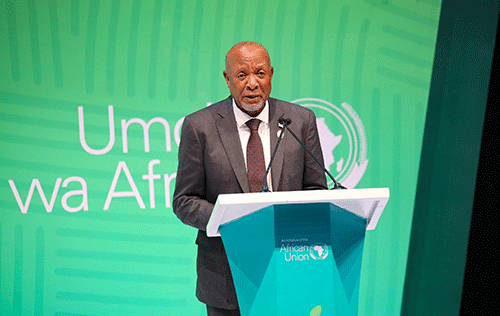President Nangolo Mbumba arrived in Livingstone, Zambia at the invitation of his counterpart Hakainde Hichilema for the Heads of State Summit on the Kavango-Zambezi Trans-Frontier Conservation Area (KAZA-TFCA).
Today’s summit is aimed at reaffirming Namibia’s political commitment to regional cooperation and integration in the development of the KAZA-TFCA. The area was established following the signing of the KAZA Treaty on 18 August 2011.
“The summit provides an opportunity for Namibia to showcase best-practices in the areas of biodiversity and nature conservation, including wildlife and conservancies management,” the Presidency announced.
State House added that the summit highlights the importance of biodiversity and ecosystems, as well as developing resilience to climate change for the benefit of the KAZA countries and their people.
Five heads of state expected at the summit are Mbumba, Botswana’s Mokgweetsi Masisi, Hichilema, Emmerson Mnangagwa of Zimbabwe, and Angola’s João Lourenço.
The KAZA-TFCA area is larger than Germany and Austria combined, and nearly twice as large as the United Kingdom. It lies in the Okavango and Zambezi River basins, where Angola, Botswana, Namibia, Zambia and Zimbabwe meet.
This vast expanse is richly-endowed with a great diversity of ecosystems and landscapes. These range from the dense and dark canopy of the tropical, dry forest of north-western Zambia, through a mosaic of woodlands, to sun-soaked tides of rolling grasslands, the parched vastness of Makgadikgadi and drifts of waterlilies floating on papyrus and reed-shrouded, shimmering.
Local communities participate with enthusiasm in the management of the TFCA through the Transboundary Natural Resources, Management Forum. This forum aims to maximise skills and resources to promote sustainable land use, conservation of wildlife and landscapes, and rural development.
Expected delegates include key policy and decision-makers as well as technocrats from the partner states, SADC, and representatives of international cooperating partners and non-state actors, notably NGOs and community-based organisations operating in or with interests in the landscape.
An estimated 400 participants are anticipated.
Zambia, the current coordinating country for KAZA, is hosting this important summit that is expected not only to review progress, but also to collectively set priorities for the future development of the eco-region.
The objectives of KAZA-TFCA include maintaining and managing shared natural and cultural heritage resources; promoting and facilitating the development of a complementary and linked network of protected areas; and providing opportunities, facilities and infrastructure for tourism development.
The conservation area further aims to protect wildlife, and provide and restore dispersal corridors and migratory routes; develop and implement programmes to enhance the sustainable use of natural resources and cultural resources for livelihood improvement and poverty reduction; and promote and facilitate the harmonisation of relevant legislation, policies and approaches in natural and heritage resource management (and transboundary animal disease prevention, surveillance and control).



